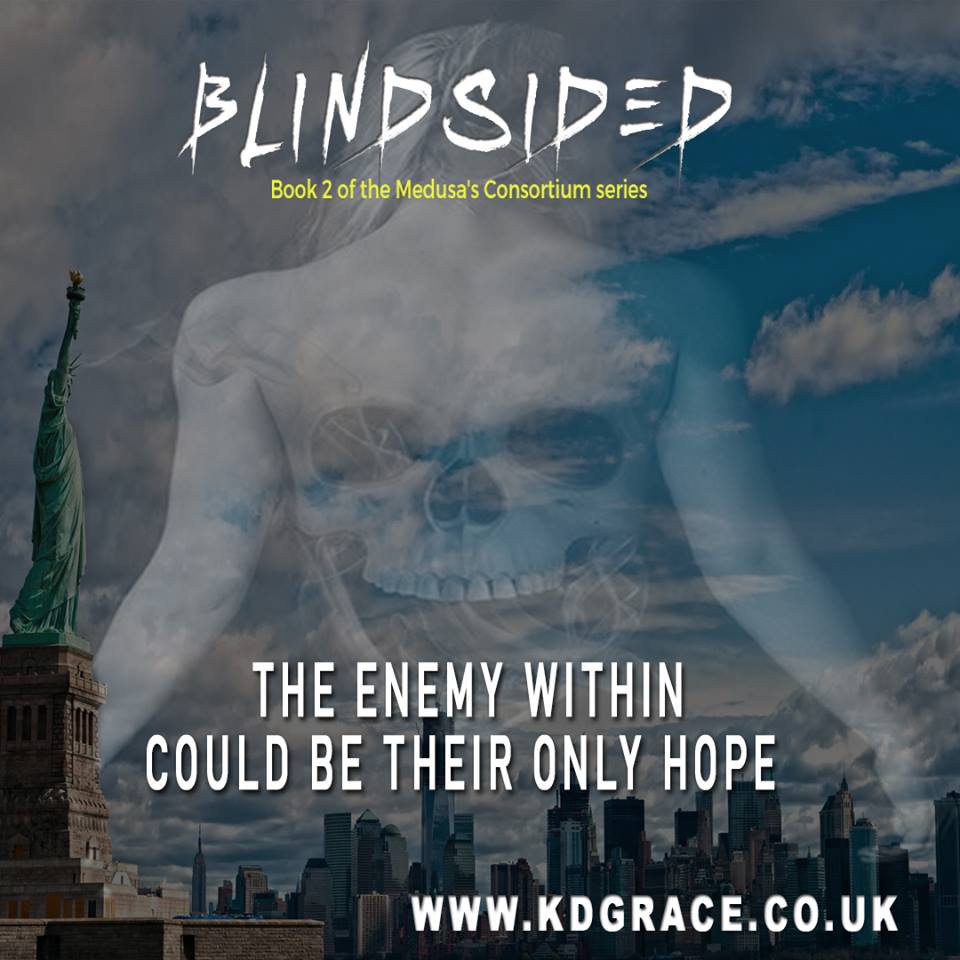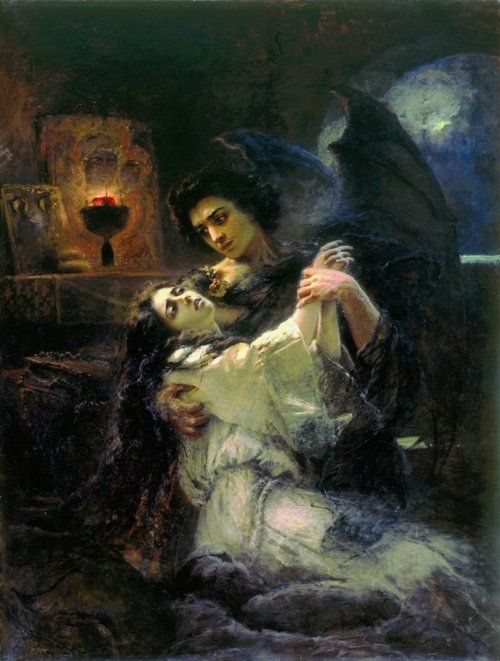
Over the years I’ve noticed certain recurring themes in my novels and stories. I’ve also noticed them in the novels of my
favorite authors – the ones whose entire body of work I devour hungrily. How can I not wonder about the psychology of those themes and what it is me and my favorite authors – quite possible all writers of story – are trying to work out in our own psyches. Back before I published my first novel, those recurring themes ended up in the enormous navel-gazing tomes of journals I wrote. These days they work themselves out in my stories, and so much the better, I think. Certainly it’s more creative and more fun.
Speaking of recurring themes, it hit me just recently that I seem to write a lot about demons. Almost all of my paranormal and urban fantasy novels have to do with demons in one way or another and, as I just released Blindsided, book two of the Medusa’s Consortium series, I found myself wondering just what my writing so much about demons says about me. Some of my stories are about exorcising the demon, getting rid of it completely, but most are about embracing the demon, or at least finding a way to live with it. Certainly that has turned out to be a major theme in the first two Medusa novels. Personally, I’m inclined to think that the latter is by far the most practical method of dealing with demons in real life. In reallife, unlike in fiction, our demons are not that easy to exorcise.
We all have them – demons. And they come in as many varieties as there are people. We writers have more than most, I think. Though I’m sure in my case a lot of my demons are linked very tightly to the fact that I’m just flat out, majorly, neurotic. Oh I’ve definitely tried exorcising them, but I’ve actually found that exercising them works better. And didn’t you see that coming from a fitness junkie and wannabe pole dancer?
The truth is I take the old adage ‘working out my demons,’ literally. I take mine out for a nice long walk or invite them to be my guests at the gym to sweat it out with the kettle bells, and it seems to suit them down to the ground. And yes, they are loving the pole dance training. I think they’re especially fond of the bruises. I guess maybe all that hard work and exercise wears them out enough that they forget to torture me. Or maybe after the endorphins have kicked in and we’re all well sweated and relaxing with a good protein shake or a handful of nuts, I just don’t notice their torment so much. But the truth is, they can often be quite useful, my demons.
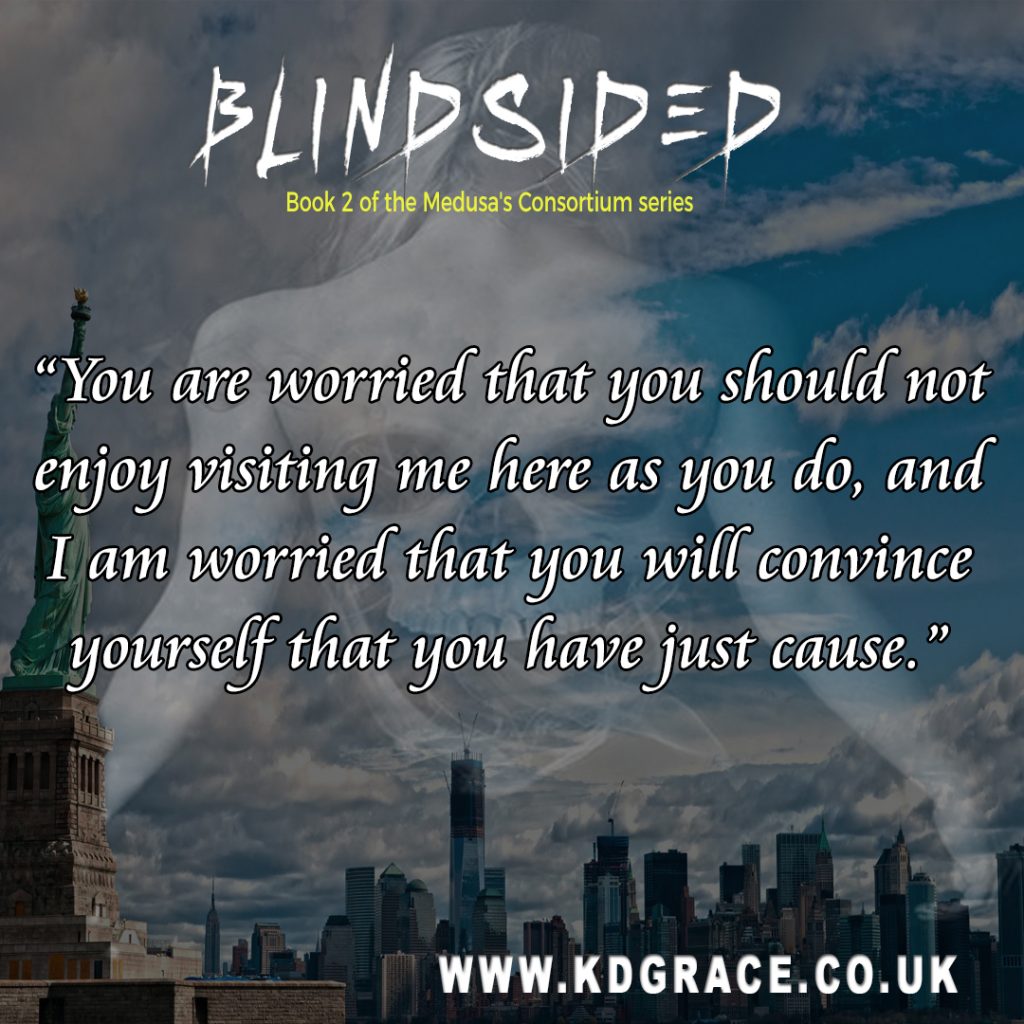
Having said that, I guess it shouldn’t come as any real surprise that I write about demons so much. If there’s anything my demons like more than to be exercised, it’s to be the center of attention in a novel or a story. Frankly, I don’t think it matters if I’m writing about demons in the literal sense or if I’m writing about the less paranormal, more concrete demons my characters battle. By writing the story, but exploring the things that frighten me, the things that make me uncomfortable, I think I’m finding a healthy way to live with those inner demons. As neurotic as writers tend to be, the truth is that the best place to write the most powerful stories is right smack dab in the middle of the neuroses – the scarier, the more irrational, the more chaotic the better. It’s a helluva ride, but if I can stick with it, the resulting story is worth the bruises and the shear terror.
Telling a story is another way of exercising my demons. I make them work for me instead of against me. In truth, I don’t suppose I ‘make’ them do anything. I think maybe they wanted to be put to the challenge all along. Don’t get me wrong, they seldom make it easy, and they’re often uncooperative. They often make it as difficult and as uncomfortable as possible for my characters and they often make the telling of my characters’ tale as squirmy and uneasy for me as they can. What the hell else is a demon supposed to do?
Writing with demons … there just might be a book in there somewhere. Oh, wait a minute, I just wrote one! Anyway, my point is that sometimes the things that cause us the most stress and make us the most fearful are the things that not only make for the best fiction, but the fact that we do write from the place of our discomfort makes the writing all the more powerful and the demons all the more bearable.
The other thing about demons is that they seem so much less terrifying when I’m writing my brains out with a story that won’t let me rest until it’s finished. It’s almost like there’s no room for demon intimidation when I’m in the grip of a tale needing to be told. For that bright and shining span of time it almost feels like instead of the demons possessing me, I possess them. Perhaps that’s the true story I was trying to tell with In The Flesh and now with Blindsided. Perhaps our demons don’t possess us so much as they drive us, and if we can just figure out how to buckle up and go along for the wild ride, then living with demons, writing with demons – paranormal or otherwise — can actually be useful.
From Blindsided, here’s a little peek at just how helpful a demon can be. Michael has been mortally wounded; Alonso is chained and just when it looks like no help is in sight … enter the demon.
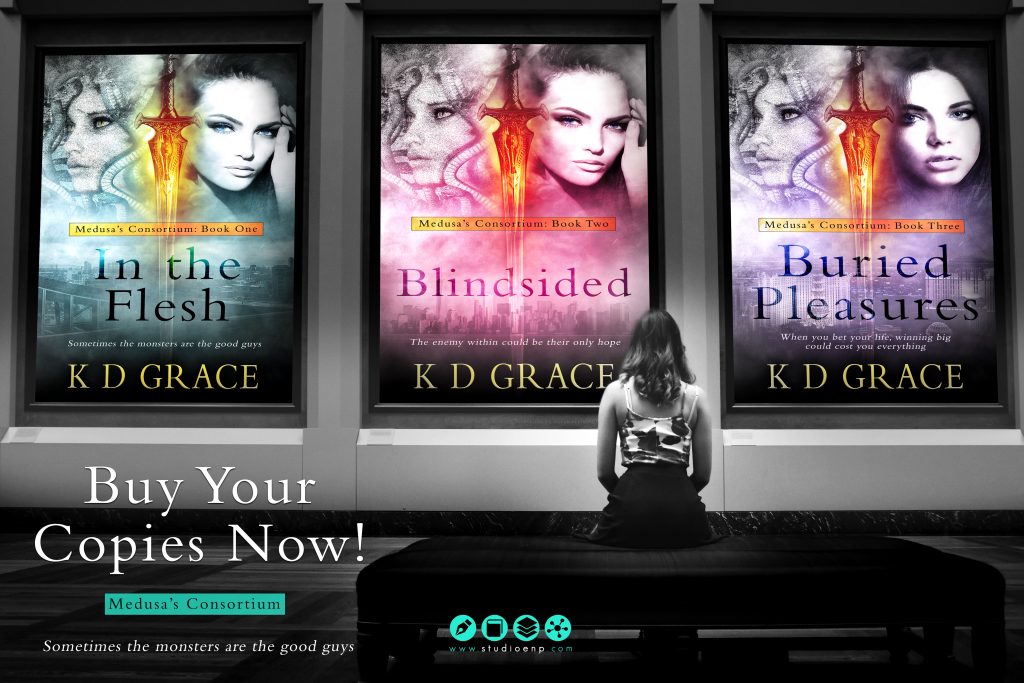
Enter the Demon – Blindsided Excerpt:
“You’re unable to fight, angel,” Cyrus said as Michael struggled to his feet. “If you surrender to me now, I won’t promise you a painless death, but perhaps it will be a little quicker, since I am expecting a guest at any moment.”
The impact was like being hit by a bus. And then it was as though the fucking bus shoved its way right on into his chest and parked there. “I don’t remember you being so rough,” he managed, his eyes watering from the experience, his heart hammering with the adrenaline rush.
“I don’t remember you being in such desperate need,” came the Guardian’s voice inside his head.
Michael knew that wasn’t true. He was always in desperate need when he was the Guardian’s lover, but then again, it was never like this, never with those he loved depending on him. Back then, it hadn’t mattered if he lived or died, but it mattered now. More than anything it mattered now.
Immediately he was full, in a way he’d never been full before. Even when the demon had taken possession of his body, it hadn’t felt like this. He felt no pain, in fact he felt so much more than himself that he wondered if he could survive it.
“You will survive it. The need of our cocks was never as great as this need, my darling Michael. I have given you more of me than I ever did before, more of me to use as needed, for I have promised Susan that I will bring you and our Alonso back safely. I have promised that we will defeat this deformed bastard of the sea god, and I will see that promise fulfilled.”
“That totally works for me,” Michael responded.
“Angel? With whom are you speaking?” Cyrus’s voice broke into the conversation. “Are you calling upon your scribe? Surely you know she can’t help you with her puny words. And Magda Gardener, well, she doesn’t care enough about you to be in any hurry to save your unholy skin, even if she could, and she can’t. Perhaps you’re delirious? Perhaps I’ve hurt you too much for you to fully experience what I have planned for you? Is that it?” But even as he spoke, he stepped back, sheathed the knife and lifted the axe at the ready.
“Trust me, Michael. Trust me as you have never trusted me before, and we shall defeat this creature together.”
Michael gave up the last vestiges of control and felt the Guardian fill every muscle fiber, every cell, felt the exquisite timing that even a retired angel could have never managed, and just as the axe fell, when it was but a hair’s breadth from severing his arm at the already-wounded shoulder, he shifted. The blade came so close that it literally shaved the hair from the skin.
As though the world around him had moved into slow motion, he grabbed the handle just above the axe head, and in one smooth movement he gave it a hard yank. Both blade and wielder went flying, hitting the metal cage where he and Alonso had been imprisoned with such force that it bent and almost collapsed.
As Cyrus struggled free, Michael scrambled to the cross so quickly that he barely knew he’d moved. He took the chains that bound Alonso in a hand that he recognized as his own, but with power he could scarcely imagine. A single tug, and the chain broke and coiled free with a clatter around Alonso’s feet.
“Watch out!” He heard Alonso’s voice in his head just in time to shove him out of the way and swing the chain, sending the end whipping out to coil around Cyrus’ neck and pulled him off balance.
“You wanted a battle. You got one,” Michael roared, feeling the Guardian even in his voice. “You will not hurt me or mine ever again, and you will take the message to your child-raping father that he’s not welcome here ever!”
Cyrus fumbled free of the chain, hefted his axe and charged, his rage sizzling through the chamber. But Michael had some rage of his own. Add that to the Guardian’s and Alonso’s and they were damn lucky the place didn’t blow itself apart. Michael tore an aging metal pipe from the wall and met Cyrus blow for blow, while Alonso took on the now advancing Myrmidons, snapping the neck of the first one and arming himself with his sword as he shoved the corpse aside and attacked.
“You’ll pay for your blasphemy with punishment clearly your god was too weak to exact,” Cyrus roared. His rage was an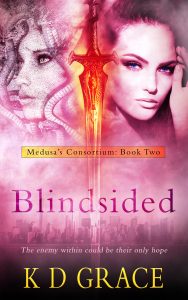 old rage that stank of fear and helplessness and needs unmet, things that Michael would have never recognized without the Guardian in residence. He ducked and rolled, and the axe came down in a flare of sparks against the concrete where
old rage that stank of fear and helplessness and needs unmet, things that Michael would have never recognized without the Guardian in residence. He ducked and rolled, and the axe came down in a flare of sparks against the concrete where
Michael’s head had been. He’d barely made it to his feet when the chamber went icy cold, and the skin on his bare arms goosefleshed as the presence of something familiar, someone familiar, filled the space.
“What is it, Cyrus, the truth not to your liking?”
All heads turned as Magda Gardener strode into the chamber, the walls coating with hoarfrost at her approach, even with her dark glasses still in place. Michael had never seen her so angry. Around her face the golden hair flew like a banner, and the serpents peeking from beneath her locks and coiling around her arms hissed, mirroring her rage.
 From the Archives
From the Archives What’s it like to be seduced by a god? What’s it like to be the object of lust for a billionaire? And ultimately what price are we willing to pay for entrance into Club Billionaire, Club Olympus, Club Undead? It’s more than lust. It’s more than love. In fact it’s all a little mercenary really. We want, we long for, a chance to take into ourselves all that we’re not. We want to know their secrets. We want those divine, powerful, filthy rich, forbidden lovers to reveal to us their inner workings just as much as they want to possess us. The ultimate question then becomes can we pay the price and survive to tell the tale ? Can we achieve our HEA and find some sense of balance in a world to which we are the interloper? Oooh! It’s always so much fun to find out.
What’s it like to be seduced by a god? What’s it like to be the object of lust for a billionaire? And ultimately what price are we willing to pay for entrance into Club Billionaire, Club Olympus, Club Undead? It’s more than lust. It’s more than love. In fact it’s all a little mercenary really. We want, we long for, a chance to take into ourselves all that we’re not. We want to know their secrets. We want those divine, powerful, filthy rich, forbidden lovers to reveal to us their inner workings just as much as they want to possess us. The ultimate question then becomes can we pay the price and survive to tell the tale ? Can we achieve our HEA and find some sense of balance in a world to which we are the interloper? Oooh! It’s always so much fun to find out.
 now on my blog, as it unfolds, I am doing a lot of dreaming. In fact, I must approach the Guardian’s prison inside of Susan through a dream, and even from there, I am never sure I am in a nightmare I can’t wake up from or a dream I want to linger in.
now on my blog, as it unfolds, I am doing a lot of dreaming. In fact, I must approach the Guardian’s prison inside of Susan through a dream, and even from there, I am never sure I am in a nightmare I can’t wake up from or a dream I want to linger in.


 old rage that stank of fear and helplessness and needs unmet, things that Michael would have never recognized without the Guardian in residence. He ducked and rolled, and the axe came down in a flare of sparks against the concrete where
old rage that stank of fear and helplessness and needs unmet, things that Michael would have never recognized without the Guardian in residence. He ducked and rolled, and the axe came down in a flare of sparks against the concrete where I wrote this post originally for the Brit Babe’s blog, but it felt like I should share it again as I get ready for the launch of
I wrote this post originally for the Brit Babe’s blog, but it felt like I should share it again as I get ready for the launch of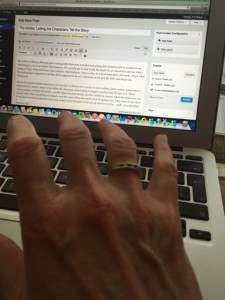 my demons like more than to be exercised, it’s to be the center of attention in a novel or a story. Frankly, I don’t think it matters if I’m writing about demons in the literal sense or if I’m writing about the less paranormal, more concrete demons my characters battle. By writing the story, but exploring the things that frighten me, the things that make me uncomfortable, I think I’m finding a healthy way to live with those inner demons. As neurotic as writers tend to be, the truth is that the best place to write the most powerful stories is right smack dab in the middle of the neuroses – the
my demons like more than to be exercised, it’s to be the center of attention in a novel or a story. Frankly, I don’t think it matters if I’m writing about demons in the literal sense or if I’m writing about the less paranormal, more concrete demons my characters battle. By writing the story, but exploring the things that frighten me, the things that make me uncomfortable, I think I’m finding a healthy way to live with those inner demons. As neurotic as writers tend to be, the truth is that the best place to write the most powerful stories is right smack dab in the middle of the neuroses – the